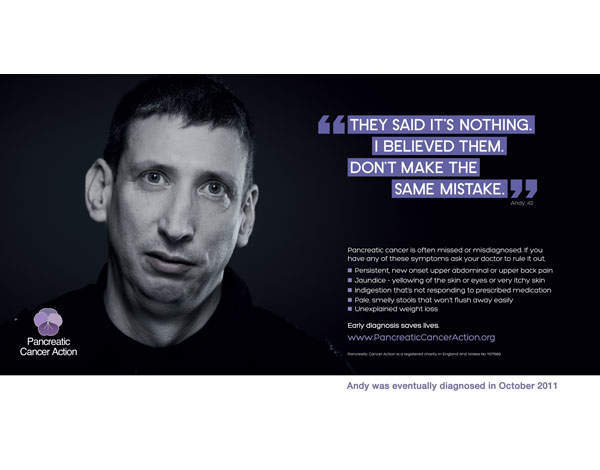

Many of us were shaken from the daze of our morning commutes last week by hard-hitting posters in the commuter newspapers and on the London Underground: bleak images of pancreatic cancer patients next to a statement ‘I wish I had breast cancer’ (or testicular or cervical cancer). The posters are part of a campaign by the charity Pancreatic Cancer Action to highlight that pancreatic cancer has much lower survival rates than other cancers, often due to late diagnosis.
The charity is following up the campaign with more posters raising awareness of the symptoms of pancreatic cancer to increase the rate of early detection, and therefore the chance of surgery – the key factor for saving lives.
As far as its original aim of awareness-raising goes, the campaign has been a success. It’s received TV, radio and press coverage and the charity has seen a 200 per cent increase in web traffic — especially to its web page which focuses on the disease symptoms. But the campaign has also been heavily criticised by other cancer charities for ‘pitting one cancer against one another’. Chris Askew, chief executive of Breakthrough Breast Cancer, is quoted saying: ‘I’ve yet to meet a man or woman with breast cancer who would consider themselves in any way fortunate to have received a diagnosis.’
This seems hard to argue with. However, looking at the figures, pancreatic cancer is a particularly devastating diagnosis faced by about 8,000 patients each year. The challenge is that due to its vague symptoms, it is often overlooked and so diagnosis frequently comes too late for surgery – which is the only treatment option available.
As a result, the average life expectancy of people diagnosed with the disease is only four to six months, and the five-year survival rate of pancreatic cancer is very low: 3 per cent as opposed to 85 per cent for breast cancer. So while there is no doubt that all cancer diagnoses are horrific, if you had to pick one, you’d surely agree with the campaign that there’s only one choice.
So how does this relate to funding and philanthropy?
Last year NPC carried out research for the charity Brain Tumour Research to examine the amount of funding that different cancers receive – an area where they are indeed pitted against one another. The analysis was based on spending data from the National Cancer Research Institute, which collates cancer research spend from UK research councils, government departments and charities.
It showed that there is a very uneven playing field when it comes to research funding for different cancers. Brain tumours for instance – a type of cancer that shortens people’s lives more than any other – received only 3.2 per cent of site-specific research funding in 2011. For comparison, breast cancer received 18.8 per cent and leukaemia 14.7 per cent. Pancreatic cancer fared even worse than brain tumours, receiving only 2.3 per cent of all research funding in 2011.
So while far fewer people are diagnosed with pancreatic cancer than breast cancer every year, those that do are faced with the bleak reality of very low survival rates and very low research funding — a combination that seems to justify a stark awareness raising campaign. And the message for a donor thinking about supporting cancer charities in all of this is that it’s advisable to consider the relative funding levels and see if there are specific gaps that could be worth supporting. NPC’s research offers a useful starting point and we also run a Selecting Great Charities workshop which details our analysis approach that can help you choose the right charity to donate to.
Lena Baumgartner is deputy director of research and consulting at New Philanthropy Capital






